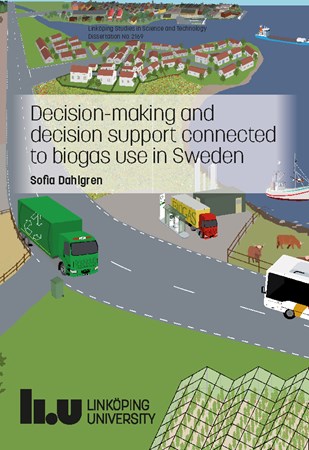The use of biogas in Sweden has come a long way since Sofia Dahlgren started research in the Division for Environmental Technology and Management. In 2016, sales of biogas cars and buses had declined, and the industry was anxious about the future. Sofia’s project at the time dealt with finding new areas of application for biogas.
“At the time, we couldn’t identify a clear direction: ‘This is what biogas can be used for’. You can only produce more biogas if you know you will be able to use it. So three of the articles in my thesis focus on where biogas can be used, and what affects its possibilities. We concluded that shipping, road transport and manufacturing industry were three markets with a potential for increased use of biogas”, she remembers.
Different ways of viewing biogas
In her thesis, Decision-making and decision support connected to biogas use in Sweden, Sofia tries to explain the advantages and disadvantages of using biogas, how decision-makers view its use, and how decision support can be used to give decision-makers a more complete picture of the versatility of biogas. The studies show, among other things, that biofuel has many environmental and societal advantages over other renewable alternatives, but that it is often more expensive.Sofia Dahlgren after successfully defending her dissertation Photo credit John Marthinson
“Biogas is not perfect, but it is an extremely good solution to many problems. The breadth of biogas applications was something I didn’t know about before I started the research project. I didn’t know about aspects such as energy security, but now that we have problems with energy supply it’s clear that locally produced biogas has a very different level of security than other renewable energy sources”, says Sofia.
“In general, decision-makers consider biogas to be a good alternative from an environmental point of view, but they have different ways of looking at it. Municipalities and regions tend to see more positive aspects of biogas, such as helping to return nutrients to the soil. Companies, in contrast, tend to see the use of biogas as an eco-friendly way of improving their public image.”
It also became clear that some actors are hesitant to use biogas due to cost. Further, they consider that legislation and support are not optimal, while the knowledge held by decision-makers about biogas is low, which leads to uncertainty about how it is to be used.
Biogas buses may not be best
The thesis comprises six published articles, and includes the study of two tools that can be used as decision support. One of these is an assessment tool with several criteria that can help decision-makers to measure several different types of influence at the same time, such as noise, air pollution and energy security. Another article analyses scenarios for the use of biogas, biodiesel and electricity for city buses, inter-city buses, trucks, and manufacturing industry. Biogas buses are common in Swedish cities, and when they are compared with electrically operated buses, Sofia sees the advantages of both.
“Electrically operated buses are preferable in cities since noise levels are lower, the buses do not emit exhaust, and they can be charged during braking. However, I show that biogas buses can be used for inter-city routes and longer journeys”, says Sofia.
Translated by George Farrants

